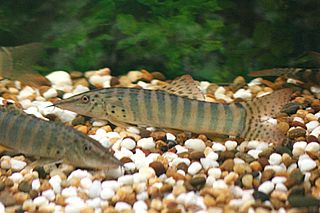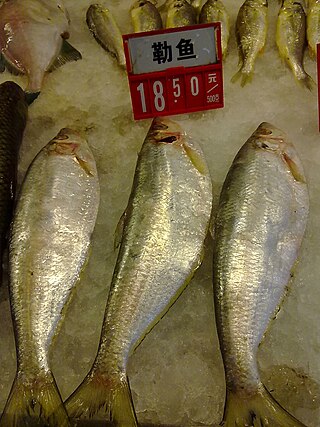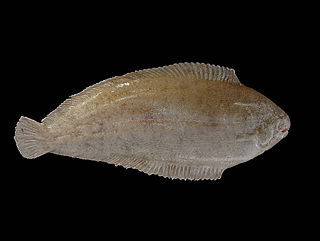
The snaggletooth shark, or fossil shark, is a species of weasel shark in the family Hemigaleidae, and the only extant member of the genus Hemipristis. It is found in the Indo-West Pacific, including the Red Sea, from southeast Africa to the Philippines, north to China, and south to Australia, at depths from 1 to 130 meters. This shark can be found near the bottom of the water column of coastal areas, but can be found at continental and insular shelves. Its length is up to 240 cm (7.87 ft). Despite being only vulnerable to extinction, this shark is very rarely seen.

Megalobrama is a genus of freshwater ray-finned fish belonging to the family Xenocyprididae, the East Asian minnows or sharpbellies. The fishes in this genus are native to fresh water in China and eastern Russia. The name is derived from the Greek word megalos, meaning "great", and the Old French word breme, a type of freshwater fish.
Cobitis elongata is a species of ray-finned fish in the family Cobitidae. It is found in Austria, Bosnia and Herzegovina, Bulgaria, Croatia, Hungary, Romania, Serbia and Montenegro, Slovenia, and Turkey.

Botiidae, the pointface loaches, is a family of cypriniform ray-finned fishes from South, Southeast, and East Asia. Until recently they were placed in the true loach family Cobitidae, until Maurice Kottelat revised the loaches and re-elevated this taxon to family rank in 2012. The family includes about 56 species.
Physoschistura elongata is a species of stone loach endemic to India. This species grows to a length of 5 centimetres (2.0 in) TL.
Hemimyzon elongata is a species of ray-finned fish in the genus Hemimyzon. It has been found in the Mekong basin in Yunnan, China. It is a benthopelagic, freshwater fish.

The Wuchang bream is a species of freshwater ray-finned fish belonging to the family Xenocyprididae, the East Asian minnows or sharpbellies. This species is found in bodies of water throughout the Yangtze basin, China, including Liangzi Lake. It is an important object of fish farming, and in 2012 its total production ranked 12th on the world list of most important fish species in aquaculture, with a total weight of 0.71 million tons and value of 1.16 billion US dollars.

Megalobrama mantschuricus, the black bream, is a species of freshwater ray-finned fish belonging to the family Xenocyprididae, the East Asian minnows or sharpbellies. This fish is found from the Amur river in eastern Russia south throug the major rivers of China to northern Viet Nam.
Megalobrama pellegrini is a species of freshwater ray-finned fish belonging to the family Xenocyprididae, the East Asian minnows or sharpbellies. This fish is endemic to upper reaches of the Yangtze River. It grows to 25 cm (9.8 in) TL.
Megalobrama skolkovii is a species of freshwater ray-finned fish belonging to the family Xenocyprididae, the East Asian minnows or sharpbellies. It is the type species of the genus Megalobrama. This species is found in the upper reaches of Yangtze.

The black Amur bream is a species of freshwater cyprinid fish in the genus Megalobrama.

The Cultrinae are one of at least 13 subfamilies of cyprinid fish. It contains ten genera.

Ilisha is a genus of ray-finned fishes in the family Pristigasteridae. The genus contains 16 species. It is similar to Pellona but lacks a toothed hypo-maxilla. The genus has a worldwide distribution in tropical and subtropical coastal waters and estuaries. Some species also enter rivers, and I. amazonica and I. novacula are largely–if not entirely–restricted to tropical rivers.

Starksia elongata, the elongate blenny, is a species of labrisomid blenny native to reefs of the western Atlantic Ocean and the Caribbean Sea. This species can reach a length of 2.3 centimetres (0.91 in) SL.

The elongate ilisha, also known as the Chinese herring or slender shad, is a species of longfin herring native to the coastal waters and estuaries of North Indian Ocean and Northwest Pacific. It is a relatively large species, up to 45–60 centimetres (18–24 in) in total length. It is an important fishery species.

Solea is a genus of soles from the Indo-Pacific and East Atlantic Oceans, and the Mediterranean Sea.
Leptobotia elongata, the imperial flower loach, elongate loach or royal clown loach, is a species of botiid fish found in flowing water in the upper and middle Yangtze basin in China. It is the largest species in the family, reaching up to 50 cm (1.6 ft) in length and 3 kg (6.6 lb) in weight. Formerly common, the numbers of this vulnerable species have declined because of overfishing, dams, habitat loss and pollution. The species is bred in captivity and a stocking project has been in place since 2010. It is sometimes kept in aquariums, but require a very large tank.
Pyrrhulina elongata is a species of fish in the Pyrrhulina genus found in the Amazon basin, specifically within the Tapajós basin, in creeks and in small ponds. They grow no more than a few centimeters.
Atherinosoma elongata, the elongate hardyhead, is a species of silverside from the family Atherinidae. This species is found in shallow estuaries, sheltered bays, inlets, lagoons and estuaries in southwestern and southern Australia from the Bowes River in Western Australia to Nelson in southwestern Victoria with a gap which runs from Point Demspter in Western Australia and Fowlers Bay, South Australia. This species was described as Atherina elongata in 1879 by Carl Benjamin Klunzinger with a type locality of King George Sound in Western Australia.
Travancoria elongata, which is also known as Periyar loach, is an endangered species of freshwater fish only found in Chalakudy River and Periyar River, from the family of Balitoridae (River loaches). These fishes grows up to 11 centimetres (4.3 in) long. Large-scale capture of these species from rivers in order to export them to the international market as ornamental fish has become a threat to this species. Included in the Red Data Book, they are on the verge of extinction.








